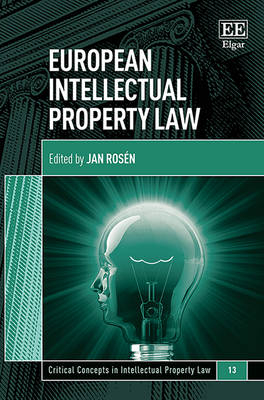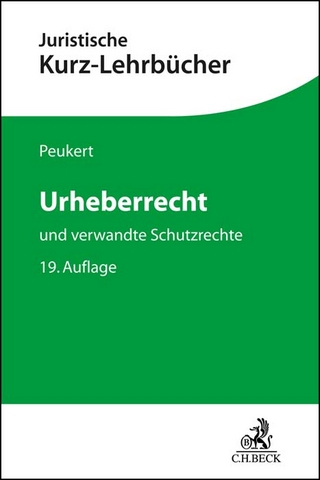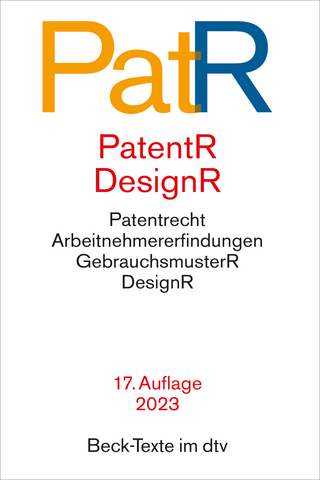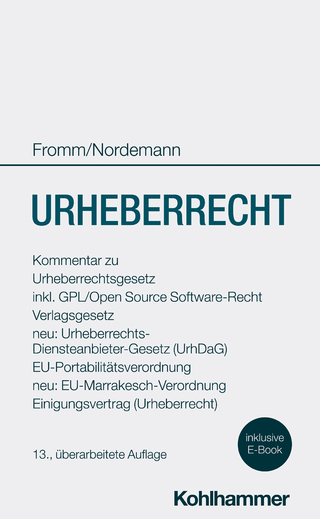
European Intellectual Property Law
Edward Elgar Publishing Ltd (Verlag)
978-1-78471-466-6 (ISBN)
This volume thoroughly covers and systematically displays the three main areas of intellectual property law - patents, trade marks and copyright - without leaving other rights of the intellectual property family aside, as it also explores geographical indications, industrial designs, trade secrets and databases. The book offers a full and complete picture of European intellectual property law, discussing the treatment of intrinsic issues on harmonization, transborder disputes, collectiveness and individualization in the different fields of intellectual property law.
With an original introduction by the editor, this book has been carefully designed to offer law students as well as practitioners a valuable instrument to understand contemporary intellectual property law within the EU.
Edited by Jan Rosén, Professor of Private Law, Stockholm University, Sweden and ATRIP President 2009–2011
Contents:
Introduction Jan Rosén
PART IIP IN THE EUROPEAN LEGAL FRAMEWORK
1. Herman Cohen Jehoram (1994), ‘The E.C. Copyright Directives, Economics and Authors’ Rights’, IIC Studies, 25, 821–39
2. Claes Granmar (2011), ‘Intellectual Property Rights and the Single Market’ Nordiskt Immateriellt Rättsskydd, Issue 4, 321–51
3. Reto M. Hilty (2012), ‘Individual, Multiple and Collective Ownership: What Impact on Competition?’, in Jan Rosen (ed.) Individualism and Collectiveness in Intellectual Property Law, Chapter 1, Cheltenham, UK: Edward Elgar Publishing, 3–44
4. Annette Kur and Dietmar Harhoff (2014), ‘Great Data, Nice Tale, but What’s the Message? The OHIM/EPO Study on the Economic Relevance
of IP-Intensive Industries in the EU’, International Review of Intellectual Property and Competition Law, 45, 617–20
5. Lydia Lundstedt (2012), ‘Transborder Patent Entitlement and Ownership Disputes: Which Forum has Jurisdiction?’, Nordiskt Immateriellt Rättsskydd (1), 6–25
6. Christophe Geiger (2010), ‘The Anti-Counterfeiting Trade Agreement and Criminal Enforcement of Intellectual Property: What Consequences for the European Union?’ in Jan Rosen (ed.) Intellectual Property at the Crossroads of Trade, Chapter 8, Cheltenham, UK: Edward Elgar Publishing, 167–81
PART IIPATENTS
7. Milosz Malaga (2014), ‘The European Patent with Unitary Effect: Incentive to Dominate? A Look From the EU Competition Law Viewpoint’ International Review of Intellectual Property and Competition Law, 45 (6), September, 621–47
8. Timo Minssen and David Nilsson (2012), ‘The Industrial Application Requirement for Biotech Inventions in Light of Recent EPO and UK Case Law: A Plausible Approach or a Mere “Hunting Licence?”’European Intellectual Property Review, 34 (10), 689–703
9. Joseph Straus (2014), ‘The Bolar Exemption and the Supply of Patented Active Pharmaceutical Ingredients to Generic Drug Producers: An Attempt to Interpret Article 10(6) of Directive 2004/27,’ Journal of Intellectual Property Law and Practice, 9 (11), 895–908
10. Geertrui Van Overwalle (2012), ‘Individualism, Collectivism and Openness in Patent Law: From Exclusion to Inclusion Through Licensing’, in Jan Rośen (ed.) Individualism and Collectiveness in Intellectual Property Law, Chapter 4, Cheltenham, UK: Edward Elgar Publishing, 71–127
11. Perttu Virtanen (2013), ‘Software Patents and “Technology Specific” Exclusion in Article 52 (3) EPC. A Legal Chimera?,’ Nordiskt Immateriellt Rättsskydd, Issue 6, 620–32
12. Alessandro Steinfl (2000), ’The Doctrine of Equivalents through the Eye of the European Patent Convention’, Casrip Symposium Series, 6, July, 114–24
PART IIITRADE MARKS
13. Annette Kur (2013), ’Not Prior in Time, But Superior in Right – How Trademark Registrations Can be Affected by Third-Party Interests in a Sign’, IIC - International Review of Intellectual Property and Competition Law, 44, 790–814
14. Alison Firth (2008), ‘Signs, Surfaces, Shapes and Structures – the Protection of Product Design Under Trade Mark Law’, in Graeme B. Dinwoodie and Mark D. Janis (eds) A Handbook of Contemporary Research, Chapter 19, Cheltenham, UK: Edward Elgar Publishing, 498–522
15. Nina Barzey (2010), ‘Functions of a Trademark – A Way of Seeing Life? The Advertising Function and the Relation Between Double Identity and Extended Protection’, Nordiskt Immateriellt Rättsskydd, Issue 4, 324–38
16. Charles Gielen (2014), ’Trademark Dilution under European Law’, Trademark Reporter, 104 (3), May-June, 693–730
17. Paul Maeyaert and Jeroen Muyldermans (2013), ’Likelihood of Confusion in Trademark Law: A Practical Guide Based on the Case Law in Community Trade Mark Oppositions from 2002 to 2012,’ Trademark Reporter, 103 (5), 1032¬–114
PART IVCOPYRIGHT AND RELATED RIGHTS
18. Silke von Lewinski (2010) ‘Introduction: Analysis: Sections 1-5’ in Michel Walter and Silke von Lewinski (eds), European Copyright Law. A Commentary, New York: NY, USA: Oxford University Press, 6–38
19. Henrik Bengtsson (2012), ‘EU Harmonization of the Copyright Originality Criterion’, World Service Group, June, 1–8
20. Ana Ramalho (2014), ’Conceptualising the European Union’s Competence in Copyright – What can the EU Do?’, IIC - International Review of Intellectual Property and Competition Law, 45 (2),178–200
21. Petteri Günther (2014), ‘The Principle of Exhaustion and the Resale of Digital Music in Europe: A Comparative Analysis of the Used Soft GmbH v. Oracle International Corp. and Capitol Records, LLC v. ReDigi, Inc. Cases’, Nordiskt Immateriellt Rättsskydd (2), 205–29
22. Johan Axhamn (2014), ’Internet Linking and the Notion of ’New Public’’, Nordiskt Immateriellt Rättsskydd, Issue 2, 110–32
PART VOTHER IP RIGHTS: GEOGRAPHICAL INDICATIONS, INDUSTRIAL DESIGNS, TRADE SECRETS, DATABASES
23. Uma Suthersanen (2011), ‘Function, Art and Fashion: Do we need the EU Design Law?’ Queen Mary, University of London, School of Law, Legal Studies Research Paper No. 88/2011, 1–22
24. Gil Grassie (2014), ’Trade Secrets: the New EU Enforcement Regime’, Journal of Intellectual Property Law & Practice, 9 (8), 677–83
25. Charlotte Waelde (2007)’ Database Copyright: The Story of BHB’ in Paul Torremsans (ed.), Copyright Law. A Handbook of Contemporary Research, Chapter 5, Cheltenham, UK: Edward Elgar Publishing, 109–32
26. Mathew J. Rippon (2014), ‘What is the Geography of Geographical Indications? Place, Production Methods and Protected Food Names’, Area, 46, June, 1–9
27. Henning Grosse Ruse-Khan (2013), ’The International Legal Framework for the Protection of Utility Models: Unmatched Flexibility for Domestic Experimentation?’, The WIPO Journal, 4 (2), 175–90
Index
| Erscheinungsdatum | 08.08.2016 |
|---|---|
| Reihe/Serie | Critical Concepts in Intellectual Property Law series |
| Verlagsort | Cheltenham |
| Sprache | englisch |
| Maße | 169 x 244 mm |
| Themenwelt | Recht / Steuern ► EU / Internationales Recht |
| Recht / Steuern ► Wirtschaftsrecht ► Urheberrecht | |
| ISBN-10 | 1-78471-466-6 / 1784714666 |
| ISBN-13 | 978-1-78471-466-6 / 9781784714666 |
| Zustand | Neuware |
| Haben Sie eine Frage zum Produkt? |
aus dem Bereich


